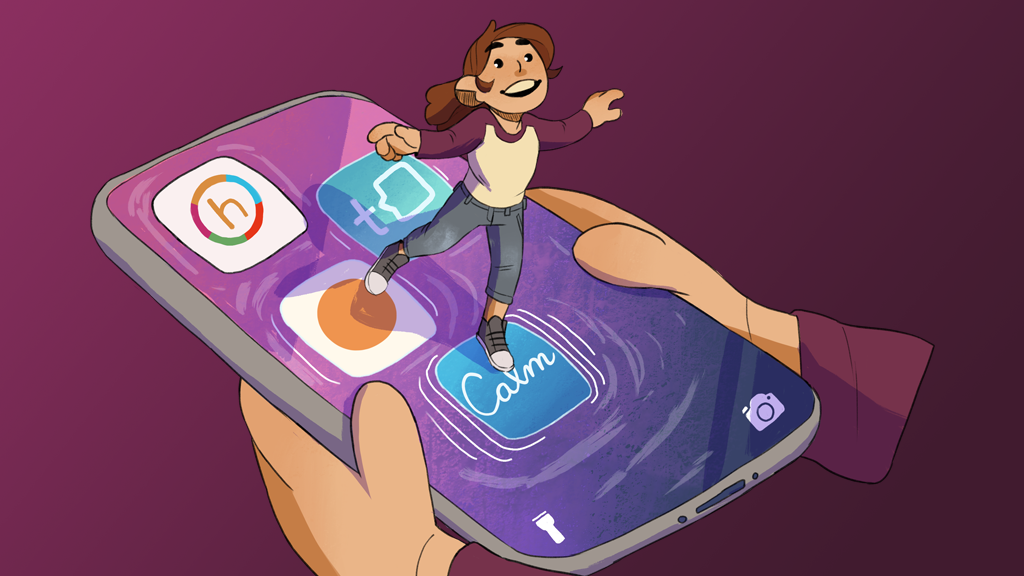As college students, we're always on the go. Running from place to place, working on one assignment after another — it can be overwhelming. In our few free moments, it’s easy to gravitate towards our phones. Why not dedicate some of that time to your mental health? Here are four apps that can help turn that free time into self-care time.
Happify
Happify is a colorful, easy-to-use app that places you on a track targeted at improving your mental health.
Acacia Parks, Happify’s chief scientist, said Happify combines research-based activities and games that could help a person’s well-being and put them in a user-friendly format. For certain activities, you enter what you did in a text field and rate how much you enjoyed the activity.
“[There are] gamification elements ... that make it like you are leveling up in life,” Parks said.
“[There are] gamification elements … that make it like you are leveling up in life.”
An example of this is Uplift, a game designed to improve your mood and teach you to think positively. It releases colorful hot air balloons with negative and positive words written on them. The goal is to click as many positive words as you can and to earn as many points as possible.
Parks stated that optimal usage is two to three activities per week, and it can reduce depression and anxiety symptoms.
“[There is] research showing that depression and anxiety symptoms make your immunity worse, make your sleep worse, make your productivity and concentration worse, make you less creative — all of these things that you need to be in college,” Parks said. “[Happify] is a pretty big payoff for a pretty small amount of time put in.”
Talkspace
Like therapy in your pocket, Talkspace is message-based therapy for when you need it most.
Your journey begins with a genuine conversation with a consultation therapist to gauge your reasons for seeking treatment. You can ask as many questions as you desire to see if Talkspace is a good fit for you.
After subscribing, your consultation therapist will suggest therapists who can best help you, but the decision is ultimately yours. At any time, you have the ability to switch therapists if the connection isn't working.
“The most important thing you have in treatment is the bond you have [with your therapist]. We feel really strongly that giving people the power over that relationship is important,” Dr. Neil Leibowitz, the chief medical officer at Talkspace, said.
Mimicking the SMS message look for ease and familiarity, Talkspace lets you send text, audio or video messages. Some therapy plans include live sessions, too.
“For most of the country, what we can give in a month really costs very similar to a single session, and you’re getting access to that therapist the whole month,” Leibowitz said. “That to me is one of our real credo [belief]— therapy for all. We really want to bring access to treatment.”
Headspace
A meditation app with attention-grabbing graphics, Headspace’s adorable cartoons and soothing voices are designed to add mindfulness to your day-to-day life. With a warm colored interface, you can choose your desired meditation theme and length — spanning from three to 20-minute segments — to ease your mind.
Reducing stress, controlling anxiety and enhancing self awareness are a few of the perks that come from meditating, Healthline said.
Sasha Mekker, a second year Graphic Design major and Headspace user for over six months, instantly fell in love with the simplicity of the app and notices improvements in her well-being when she mediates regularly.
“Some weeks I won’t [meditate] because I’m busy ... but when I do use it, it’s such a change,” Mekker said. “Especially with sleep. I can never fall asleep, and if I [meditate] before bed, I always fall asleep super fast.”
Headspace has a sample of basic meditations and sleepcasts for everyone. The majority are behind a paywall — a relatively inexpensive one with the student discount — but the first meditation of each course is typically available.
“It’s five minutes. It’s not like you have to sit there for an hour and try to calm yourself down,” Mekker remarked. “I think that’s why so many people like it and why it has good reviews — because of how easy it is.”
Calm
Much like Headspace, Calm is a meditation app designed to take your mind to another place.
After first opening the app, you instantly see relaxing backgrounds, like the warm glow of a fireplace or moving waters on a lake accompanied by the comforting sounds of the scene.
Tons of different meditation tracks are available. Not only does Calm offer sleep stories and guided meditations, but also “10 minute guided video lessons on mindful movement and gentle stretching,” the Calm website reads.
When breathing becomes tough, the Calm app has a special feature simply called “Breathe.” A periwinkle bubble expands and shrinks to the rhythm of your guided breathing for as long as you need to use it.
Past the free content, a seven-day trial period unlocks Calm Premium before a subscription is required.
Users tend to love the app, and Apple named it the 2017 iPhone app of the year. Business insider said, “[It] promises to help users sleep better, boost confidence and reduce stress and anxiety.”
No matter how or why you may need some extra support, simply downloading an app can be a good start. With a few clicks, help is always an app away.








